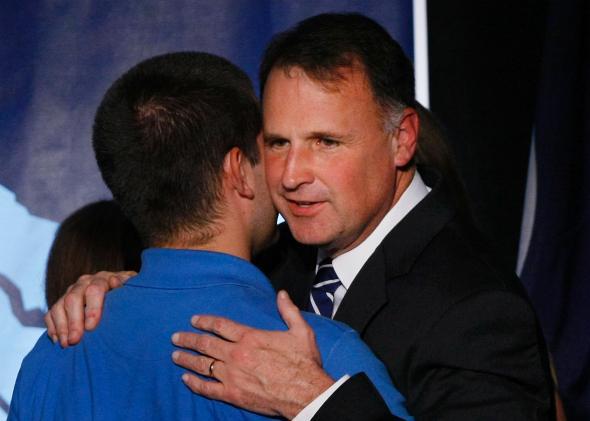Police are still trying to piece together exactly what happened at the home of Virginia state Sen. Creigh Deeds Tuesday morning, but authorities appear increasingly convinced that it was an attempted murder and suicide. The working theory is that the Democratic lawmaker’s 24-year-old son, Gus, assaulted Deeds, stabbing him several times, before taking his own life with a gun.
But as police and reporters continue to color in the details, a secondary storyline is emerging, one involving both Gus’ mental state in the days before the incident and why, despite reportedly failing a court-ordered mental health evaluation on Monday, Gus was at his father’s home yesterday morning and not in an area hospital where he might have gotten the help he needed.
On Monday, local officials say, a magistrate issued an emergency custody order for Gus after he had been evaluated by officials at the Rockbridge County Community Services Board. But he was not admitted to a hospital, officials say, because they couldn’t find an open psychiatric bed in time and had no other choice but to release him. Time magazine has a nice rundown of how a typical evaluation can turn into a race against the clock for mental-health workers:
Under Virginia’s emergency-custody-order process, the family of a patient petitions a magistrate to order an evaluation, and medical staff have a four-hour window to decide whether someone should be committed, according to [Dennis Cropper, executive director of the Rockbridge County Community Services Board], who declined to speak about the specifics of the Deeds case out of respect for the family’s privacy.
The clock starts when a sheriff picks up the patient and brings him or her in for clinical evaluation. Once the evaluation is complete, physicians make a recommendation to the magistrate. If the magistrate approves, medical staff then search for an available hospital bed.
But if officials can’t find a spot for the patient before their time window (which, in some cases, can be extended to six hours) closes they have to release him or her, as was apparently the case with Gus on Monday. Such cases are rare but not unheard of, particularly in rural areas like where Deeds lives—Cropper estimates it happens about 3 percent of the time—and are common enough to have a name, “streeting.”
Making this particular story that much more complicated, however, is a new report this afternoon from the Washington Post that suggests the officials who were looking for a bed for Gus might not have been looking in the right places. According to the report, there were indeed available psychiatric beds in at least three relatively nearby hospitals on Monday. “Officials with Western State Hospital in Staunton, Rockingham Memorial Hospital in Harrisonburg and the University of Virginia Medical Center in Charlottesville — all within two hours of Bath — confirmed Wednesday that the facilities had been in a position to accept Deeds’s son but were never asked to,” the paper reports.
It remains unclear which hospitals Bath officials did reach out to, and why they didn’t know there was a spot for him in one of those hospitals where beds seem to have been available. For now, those remain two questions among many in a bizarre story that we still only have the rough outlines of.
***Follow @JoshVoorhees and the rest of the @slatest team on Twitter.***
***Follow @JoshVoorhees and the rest of the @slatest team on Twitter.***
